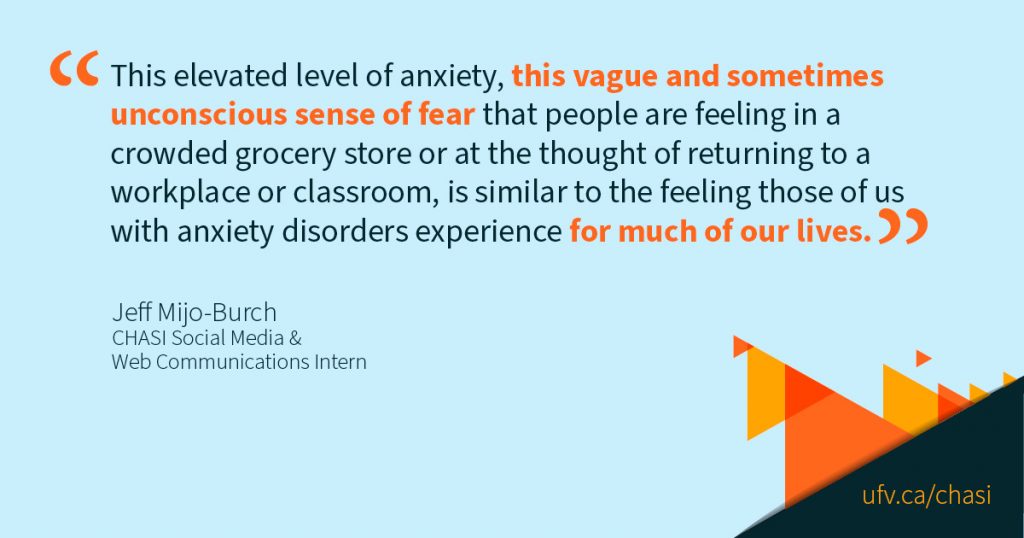To mark Action Anxiety Day, CHASI Social Media and Web Communication Intern Jeff Mijo-Burch is sharing some of his personal experience with anxiety to consider as we prepare for an anxiety-filled transition to a post-pandemic world.
Today, June 10, is the first annual Action Anxiety Day. This day, which calls on supporters to spread awareness, wear blue and orange, and raise funds for anxiety treatment, could not have come at a more appropriate time. As Canada’s vaccination rates rise quickly and governments begin to end restrictions, the promise of a “return to normal” is both exciting and, to many of us, terrifying.
I was diagnosed with generalized anxiety disorder (GAD) just before the pandemic began, but it’s a reality I’ve dealt with for over a decade, perhaps my whole life. For a lot of years, it was easy to write off as just nerves. It never seemed like a huge issue compared to the mental health challenges other people experienced. But it did have real effects on my mental, emotional, and physical health. Day to day, it kept me from leaving my comfort zone, preferring to avoid new experiences and social situations, and made it challenging to ever relax. At its worst, it affected my stomach so badly that I could barely eat and lost 15 pounds in three weeks.

According to national polls, more than one in four Canadians reported high levels of anxiety. A majority say that COVID-19 has caused increased stress or anxiety.
This elevated level of anxiety, this vague and sometimes unconscious sense of fear that people are feeling in a crowded grocery store or at the thought of returning to a workplace or classroom, is similar to the feeling those of us with anxiety disorders experience for much of our lives. It can be the conscious worrying of what could go wrong, but it can also be the underlying dread that something is off, and that our defenses should be up.
Now, with so many people experiencing anxiety of this level, it’s the perfect time to examine the way we — as a community — talk about anxiety. It is highly stigmatized, but perhaps in a different way than other forms of mental illness. Where they may be perceived as scary or dangerous, anxiety, like depression, is often dismissed. Because we all experience some level of anxiety, recognizing and accepting when it’s seriously impacting our lives is difficult, and may be met with skepticism from ourselves and others.
If your anxiety is overwhelming, if the anticipation of what the coming months could look like terrifies you, if every trip to the store fills you with dread, it’s worth considering treatment for your anxiety. Counselling services unfortunately are not affordable for everyone, but many workplaces and healthcare plans do cover them. There are also many, many free resources and apps available.
For myself, after an assessment from my doctor, I started on an anxiety medication in 2019 and it has absolutely helped. My anxiety isn’t gone, but I have a much easier time relaxing and pushing the anxiety away. It’s also almost completely eliminated the physical symptoms that caused me so many issues in the past. This year I finally began seeing a counsellor on a regular basis thanks to UFV’s own counselling services, and they have been a wonderful component of understanding how my mind works and how to further minimize my anxiety.
With so many of us experiencing anxiety right now, we have the opportunity to shift the conversation around it and normalize seeking help when anxiety takes over our lives. Don’t write it off and push it aside. Your life will be better if you confront anxiety head-on.
This article is part of CHASI’s ongoing series acknowledging some of the significant annual observances that align with our core values.

